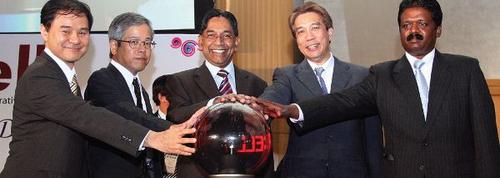Friday, March 4th, 2011 14:05:00

TEAMING UP FOR HEALTH: (From left) NiSCELL AIET technical advisor Dr Hiroshi Terunuma, Koichi Ito from the Japanese Embassy, Dr Mohd Ismail, Dr Ridzwan and NiSCELL SCT technical advisor Dr Samuel JK Abraham
KUALA LUMPUR: A new form of cancer treatment could be finding its way to hospitals nationwide soon.
Using a patient's own blood to attack cancerous cells, the two new treatments are called autologous immune enhancement therapy (AIET) and stem cell treatment (SCT). Both are based on research findings dating from the 1980s and refined further in Japan over the past 20 years.
Such treatments are being prepared here by Nichi-Asia Life Science Sdn Bhd (NiSCELL), which received its licence as a private blood bank from the Health Ministry two years ago.
"NiSCELL will offer its products and facilities to doctors and hospitals nationwide who wish to embark on these treatments," said Health Ministry director-general Tan Sri Dr Mohd Ismail Merican at the recent launch of the cancer treatment technology.
"While the ministry supports innovative therapies, it must be conducted ethically and with clinical trials if it still lacks robust evidence of success."
NiSCELL chairman Datuk Dr Ridzwan Bakar said the therapies enhance the body's immune mechanisms directly and indirectly to fight cancer.
"As this therapy uses the patient's own cells for treatment, it is safe and does not have any short-term side effects. It is also considered safer than chemotherapy. The method is still on a clinical trial basis and we are still testing to see if there are any long-term side effects.
"Our RM5 million facility in Kota Damansara, recognised by the Malaysian Pharmaceutical Control Board, is one of the few facilities producing stem cells for AIET."
He said the cost for treatment is around RM15,000 per dose but once the technology becomes more widely used, the price is expected to drop.

